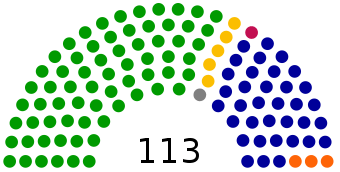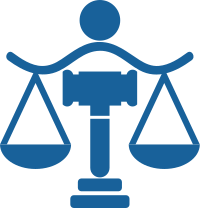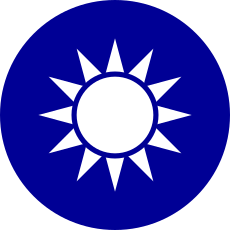Executive Yuan
| 行政院 | |
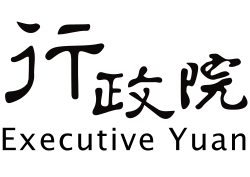 | |
| Agency overview | |
|---|---|
| Formed | 25 October 1928 |
| Jurisdiction |
|
| Headquarters | No. 1, ZhongXiao E. Rd., Zhongzheng District, Taipei |
| Employees | 407 |
| Agency executives |
|
| Website | www.ey.gov.tw |
| Executive Yuan | |||||||||||||||||||||||||||
| Chinese | 行政院 | ||||||||||||||||||||||||||
|---|---|---|---|---|---|---|---|---|---|---|---|---|---|---|---|---|---|---|---|---|---|---|---|---|---|---|---|
| Literal meaning | Executive Court | ||||||||||||||||||||||||||
| |||||||||||||||||||||||||||
| This article is part of a series on the |
| Politics of the Republic of China |
|---|
 |
| Commonly known as Taiwan |
|
Leadership |
|
|
|
Other branches 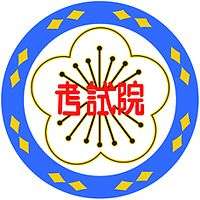
|
|
Related topics |
|
Taiwan portal |
The Executive Yuan (EY; Chinese: 行政院; pinyin: Xíngzhèng Yuàn; Wade–Giles: Hsing2-cheng4 Yüan4; Pe̍h-ōe-jī: Hêng-chèng Īⁿ; literally: "Executive Court") is the executive branch of the central government of the Republic of China.
Organization and structure

It is headed by a president (often translated as premier), and has a vice president (vice premier), and twelve cabinet ministers, various chairpersons of commissions, and five to nine ministers without portfolio as its members. The vice premier, ministers and chairpersons are appointed by the President of the Republic of China on the recommendation of the premier.[3]
Its formation, as one of five Yuans of the government, stemmed from the Three Principles of the People, the constitutional theory of Sun Yat-sen, but was adjusted constitutionally over the years to adapt to the situation in the ROC by changes in the laws and the Constitution of the Republic of China.
Ministries
| Title Name Executive (Ministry) | Minister | |||
|---|---|---|---|---|
| English Name | Chinese | Pinyin | Pe̍h-ōe-jī | |
| Interior | 內政 | Nèizhèng | Lāi-tsìng/Luē-tsìng | Yeh Jiunn-rong |
| Foreign Affairs | 外交 | Wàijiāo | Goā-kau | David Lee |
| National Defense | 國防 | Guófáng | Kok-hông | Feng Shih-kuan |
| Finance | 財政 | Cáizhèng | Châi-chèng | Sheu Yu-jer |
| Education | 教育 | Jiàoyù | Kàu-io̍k | Pan Wen-chung |
| Justice | 法務 | Făwù | Hoat-bū | Chiu Tai-san |
| Economic Affairs | 經濟 | Jīngjì | keng-chè | Lee Chih-kung |
| Transportation and Communications | 交通 | Jiāotōng | Kau-thong | Hochen Tan |
| Health and Welfare | 衛生福利 | Wèishēng-Fúlì | Uī-sing Hok-lī | Lin Tzou-yien |
| Culture | 文化 | Wénhùa | Bûn-hoà | Cheng Li-chun |
| Labor | 勞動 | Láodòng | Lô-tōng | Kuo Fang-yu |
| Science and Technology | 科技 | Kējì | Kho-ki | Yang Hung-duen |
Councils and Commissions
Empowered by various laws, or even the Constitution, under the Executive Yuan Council several individual boards are formed to enforce different executive functions of the government. Unless regulated otherwise, the chairs are appointed by and answer to the Premier. The committee members of the boards are usually (a) governmental officials for the purpose of interdepartmental coordination and cooperation; or (b) creditable professionals for their reputation and independence.
- Veterans Affairs Council
- Council of Agriculture
- Atomic Energy Council
- Hakka Affairs Council
- Council of Indigenous Peoples
- Mainland Affairs Council
- National Development Council
- Public Construction Commission
Minister-presided Commissions
According to Articles three and four of the organic law of the Executive Yuan Council, the commissioners of following two commissions hold the rank of minister.
Independent Commissions
There are, or would be, five independent executive commissions under the Executive Yuan Council. The chiefs of these five institutions would not be affected by any change of the Premier. However, the related organic laws are currently under revision or dispute.
- Central Bank
- Central Election Commission
- Fair Trade Commission
- Financial Supervisory Commission
- National Communications Commission
Directorates General
Authorized by Article Five of the organic law of the Executive Yuan Council]]
Authorized by Article Nine of the amendments of the Constitution of the Republic of China:
National Museum
Organizations no longer under Executive Yuan
Due to periodical restructuring of the government body, there are some agencies which may be dissolved or be merged with other bigger and more active agencies. Based on Executive Yuan website, the following bodies are no longer the agencies under Executive Yuan:[4]
- Aviation Safety Council, since 20 May 2012[5]
- Consumer Protection Committee, since 1 January 2012
- National Disaster Prevention and Protection Commission: a task-force-grouped committee authorized by the law of Disaster Prevention and Protection.
Dissolved or cease to function
- National Unification Council on 27 February 2006
- Government Information Office on 20 May 2012[3]
- Council for Economic Planning and Development on 21 January 2014
- Research, Development and Evaluation Commission on 21 January 2014
Ministers without portfolio
In the Executive Yuan Council, the current ministers without portfolio are:[6]
- Audrey Tang
- Chang Ching-sen, also serving as Governor of Fujian Province
- Chen Tain-jy, also serving as Minister of National Development Council
- Hsu Jan-yau, also serving as Governor of Taiwan Province
- John Deng[7]
- Lin Mei-chu, also serving as the Minister of Mongolian and Tibetan Affairs Commission
- Lin Wan-i
- Wu Hong-mo, also serving as Minister of Public Construction Commission
- Wu Tsung-tsong
Executive Yuan Council
The Executive Yuan Council, commonly referred to as "The Cabinet" (內閣), is the chief policymaking organ of the ROC government. It consists of the premier, who presides over its meetings, the vice premier, ministers without portfolio, the heads of the ministries, and the heads of the Mongolian and Tibetan Affairs Commission and the Overseas Chinese Affairs Commission. The secretary-general and the deputy secretary-general of the Executive Yuan also attend, as well as heads of other Executive Yuan organizations by invitation, but they have no vote. Article 58 of the Constitution empowers the Executive Yuan Council to evaluate statutory and budgetary bills concerning martial law, amnesty, declarations of war, conclusion of peace or treaties, and other important affairs before submission to the Legislative Yuan.
Relationship with the Legislative Yuan
The Executive Yuan Council must present the Legislators with an annual policy statement and an administrative report. The Legislative Committee may also summon members of the Executive Yuan Council for questioning.
Whenever there is disagreement between the Legislative Council and Executive Yuan Council, the Legislative Committee may pass a resolution asking the Executive Yuan Council to alter the policy proposal in question. The Executive Yuan may, in turn, ask the Legislators to reconsider. Afterwards, if the Legislative Council upholds the original resolution, the premier must abide by the resolution or resign. The Executive Yuan Council may also present an alternative budgetary bill if the one passed by the Legislative Committee is deemed difficult to execute.
Leaders
.jpg)
Executive Yuan Presidents
Executive Yuan Vice Presidents
Executive Yuan Secretary-Generals
- Authur Iap (20 May 2004 – 1 February 2005)
- Lee Ying-yuan (1 February 2005 – 19 September 2005)
- Liu Yuh-san (19 September 2005 – 21 May 2007)
- Chen Chin-jun (21 May 2007 – 20 May 2008)
- Hsueh Hsiang-chuan (20 May 2008 – 10 September 2009)
- Lin Join-sane (10 September 2009 – 5 February 2012)
- Lin Yi-shih (6 February 2012 – 29 June 2012)
- Chen Shyh-kwei (10 July 2012 – 18 February 2013)
- Chen Wei-zen (18 February 2013 – 25 February 2014)
- Lee Shih-chuan (26 February 2014 – 24 January 2015)
- Chien Tai-lang (24 January 2015 – 20 May 2016)
- Chen Mei-ling (20 May 2016 –)
Transportation
The Executive Yuan building is accessible within walking distance east of Railway Station or west of Shandao Temple Station of the MRT.
See also
References
- ↑ "Mao Chi-kuo named as premier (update)". focustaiwan.tw.
- ↑ "Taiwan retains most Cabinet members in reshuffle". focustaiwan.tw.
- 1 2 "Executive Yuan, R.O.C.)-Structure & Functions". Ey.gov.tw. Retrieved 2014-05-07.
- ↑ "Executive Yuan, R.O.C. (Taiwan)-Ministries and Agencies". Ey.gov.tw. 2006-06-15. Retrieved 2014-05-07.
- ↑ http://www.asc.gov.tw/asc_en/aboutasc_2.asp
- ↑ "Premier-designate finalizes his Cabinet lineup - Politics - FOCUS TAIWAN - CNA ENGLISH NEWS".
- ↑ http://focustaiwan.tw/news/aipl/201608090034.aspx
External links
| Wikimedia Commons has media related to Executive Yuan. |
- Official website (Chinese)
